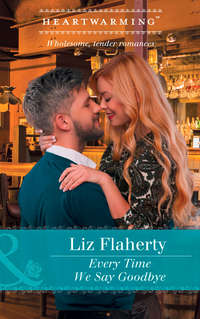
Полная версия
The Happiness Pact
Tucker stepped forward, but she shook her head at him. “I’m okay.” She smiled and patted the cow’s hindquarters with her free hand. “She is, too. She’s just tired.”
“Do you think it’s going to be all right?” Gavin’s tone was solemn. “Sometimes cows die giving birth. Their calves die, too.”
“You’re right.” Libby’s expression was as serious as the boy’s. “It seems as if there are risks in everything you do, but if you don’t risk anything, you don’t gain anything, either.” She grinned suddenly, her face lighting up. “And you’ll never have any adventures. Right, Tuck?”
“Right.” He sounded too hearty, he knew he did, but the boy’s face brightened, too, so it was okay.
“Okay, good. There we go. Tuck, you set to back me up? Dan, you want to be there to give Gavin a hand if he needs it? He probably won’t, but just in case.” Libby stepped away, holding the end of one of the chains and giving the other to Gavin. “Now, when she strains, we’re going to pull real slow and steady, working with her contraction. Don’t jerk and don’t pull too hard. Think you can do that?”
“Yes, ma’am.” He looked frightened, but no more so than his father.
“It scares me, too,” Tucker told the boy, moving into place behind Libby, “and I’ve done it before. I think you’re supposed to be worried about it.”
Gavin took a deep breath. “Well, if I am, I’ve got that part down. Now, ma’am?”
“Now.”
Rewarding the efforts of a small woman in a red dress, a determined young boy and an extremely tired Holstein, a large calf was born in a rush of fluid. Tucker stepped away from Libby in time to catch it, although he fell under its weight.
“You did it, Joanna! You did it!” Gavin dropped the chain and ran around to hug his cow’s neck. “It’s a...what is it, Dad?”
“A heifer,” said Dan, helping to rub the calf down with straw. “A big, strong girl.” He looked up at where Libby was shaking her arm to regain full feeling in it. “We can’t thank you enough.”
“Yes, you can,” she promised. “I know you don’t know us at all, but if you’ll let us take a bath and change our clothes, I think we’ll consider ourselves thanked.”
“I’m pretty sure we can accommodate that,” said Alice, “plus there’s a roast in the oven just crying out to be eaten.”
Tucker exchanged glances with Libby and shrugged slightly. “Sounds great.”
A few more inches of snow had fallen while they’d been in the barn. Drifts created whipped-cream mountains everywhere they looked, some of them all the way up to the eaves of the garage. “I have a tractor,” said Dan. “I’ll be able to get you out of the ditch, but you might want to plan on spending the night. I don’t think you’ll get far, especially without all-wheel drive.”
“We don’t want to put you out,” Libby protested.
Alice and Dan laughed together. “You haven’t been inside yet.”
Except for its fully finished and beautiful kitchen, the old farmhouse was a construction zone. “It will be wonderful someday,” said Alice.
Tucker looked around, at framework with doors but no walls, at the living room subfloor partially covered with area rugs, at the beautifully curved stairway without a rail. He saw where the children had hung their coats inside the back door in what would eventually be a mud/utility room. He watched as Dan Parsons patted his wife’s stomach, high-fived his son over the birth of the calf and knelt to talk seriously to little Mari about how the new baby would be all right sleeping in the barn with her mama.
It will be wonderful someday. “No.” Tucker met Libby’s eyes. This is it. This is what I want. “It’s wonderful now.”
CHAPTER THREE
LIBBY SLEPT ON an inflatable mattress on the floor of Mari’s room. When Stripes, the kitten, crawled into bed with her, Mari followed, bringing her own pillow. The blow-up mattress was twin-size, so it didn’t leave a lot of room, but Libby slept well anyway, the little-girl scent and warmth of her roommate making for a comfortable night.
She woke before dawn, dressed in the clothes Tucker and Dan had brought in from the car last night, and plaited her hair into a messy braid. She tiptoed downstairs to the kitchen, stopping on the landing to look through the window and find Venus, clearly visible in the post-storm sky. “Hi, Mom,” she whispered, and went down the rest of the stairs. She found her hostess at the table with a cozied pot of what smelled deliciously like Earl Grey. “Ah,” said Libby, keeping her tone hushed, “a girl after my own heart.”
Alice waved her to a chair. “And one after mine, who knows any voice over a whisper will wake my children at the crack of dawn on a snow day. We homeschool, but we adhere to the public-school schedule.”
By the time she and Alice had drunk two pots of tea and told each other most of their life stories, she’d constructed a quiche guaranteed to make the kids happy. “But don’t call it a quiche,” Libby warned. “Call it something else so they don’t know that’s what they’re eating. In the tearoom, we call it yellow junk with bugs in it. They all know it’s not really bugs, but they do love the whole gross-out part of the story.”
“Do they know it’s spinach?” Alice slipped the pie plate into the oven.
Libby gave her a blank look. “Know what’s spinach?”
After breakfast, Dan drove his tractor up and down the driveway, a blade on the front pushing snow out of the way. Tucker, with Gavin’s help, shoveled out from under the Camaro so that the wheels had a place to go when Dan pulled it out. There was some damage done to the bumper and the spoiler, but they were repairable. More importantly, the car didn’t want to pull in one direction or the other when Tucker drove it. If the roads were semiclear, they should be able to get home without encountering any more ditches—provided they didn’t meet other trucks whose drivers had homicidal tendencies.
They visited the barn, where Joanna was munching cheerfully on some hay and little Liberty was gamboling about the stall. “Do you mind?” said Gavin. “Mom said not everyone would want to have a cow named after them.”
“Well, I would.” Libby gave the boy a hug before he could get away and grinned at his mother. “We had a cow named Alice, too. I think she had an even dozen calves. My dad really liked her.”
Alice grabbed her stomach and groaned. “Three’s going to be enough for this Alice!” She hugged Libby, then reached past her to hug Tucker, too. “We’ll be down to see you in spring.”
“We’ll be waiting,” Libby promised. She knelt to smile into Mari’s eyes. “Thank you for sharing Stripes with me. When you come see me, I’ll introduce you to Elijah.”
“Will he like me?”
“Yes, he will.”
“I’ll bring him a present.”
“Thank you.” Libby wanted to cry. She made her eyes really wide and blinked hard against the tears. They didn’t come, of course. Libby often wanted to cry, but she never did.
Tucker was beside her then, taking her hand when she straightened. “I have to help her walk,” he explained to Mari, “so she won’t slip.”
“You could carry her,” the little girl suggested. “Daddy carries me sometimes so I won’t fall.”
Libby gave Tucker a none-too-gentle push with her elbow, almost knocking them both off balance. “It’ll be okay. He might hurt his back.”
A few minutes later, they were in the Camaro and back on the freshly plowed road headed toward Miniagua. Tucker reached to tweak her braid. “I’m sorry about the adventure.”
She laughed, clasped his hand and gave it a squeeze. “I thought that was a pretty good one, myself. How do you beat making a whole family of new friends and having a calf named after you?”
* * *
“THE NEW NURSE-MIDWIFE at A Woman’s Place—” Libby looked around the tearoom to be sure no one needed anything and almost flinched at the Valentine’s Day decorations she thought she might have overdone. Satisfied everyone was taken care of, she took the empty chair at the table Arlie shared with her stepsister, Holly, and her stepmother, Gianna. “Is she single?”
Arlie nodded. “Divorced.”
“How old is she?”
Arlie tilted her head thoughtfully. “Thirty.”
“Ish,” Holly added.
“Very pretty,” said Gianna.
“What’s her name?”
“Meredith.”
“Kids?” Libby poured some tea into her cup.
“Two.” Arlie set down her fork and stared fixedly at her. “One of each. Six and eight. I think maybe she’s a Taurus. She puts purple highlights in her hair and it looks great—I might hate her a little for that. Anything else you want to know right off the top of your head?”
Libby thought of Allison’s little boy. And of Allison. No chemistry, Tucker had said, and when Libby had urged him to at least give it a chance, he’d caved and asked Allison out to dinner. She’d gone, and they’d ended up back at Anything Goes laughing because their chemical disconnect was so complete they thought maybe they were siblings separated at birth. Tucker had introduced Allison to an engineer who worked at Llewellyn’s Lures and now they were dating.
Next had been Cindy, who worked at the winery, followed by Risa, who taught algebra and coached middle school volleyball. After Risa, Libby had threatened Tucker’s life if he used the word chemistry in her presence ever again.
“Well,” Libby explained, taking in the three pairs of curious eyes at the table, “Valentine’s Day is in two weeks. I thought maybe I could find Tucker a good date for the party at the clubhouse. My last day off, he took me to the casino at Rising Sun and gave me two hundred dollars. When I won two thousand and he lost five hundred, I tried to give the two hundred back, but he wouldn’t take it.” She was a little embarrassed. “I think I could really like gambling, so I probably don’t want to go back.”
“Seriously? You won?” Holly’s eyebrows rose. “I don’t think I’ve ever done that.”
Libby nodded. “Yes. I’d won before, but to me winning just meant not losing, as in I went home with the same twenty dollars I took to gamble with. So two thousand was great.”
“What did you do with it?” Arlie went back to eating.
Libby sighed blissfully. “I got a new stove. I’d been getting by on the two four-burner ones I bought used when I opened the tearoom ten years ago. They were okay for a long time, but I was down to two burners on one and three on the other, and one of the ovens wasn’t working right. If I had to bake for a party or got a double order from someone, I was in a mess.” She nodded at Gianna. “You know that—I borrowed your oven often enough. You need to come into the kitchen and see it before you leave. I feel like a kid at Christmas.”
All of the Gallagher women loved to cook, so they had to understand the feeling. “Well, then, you do need to find Tuck a good date. He earned at least one.” Holly chuckled. “I think he’s spent time with about everyone on the lake, though, except maybe Mollie and you and me. And don’t even think of asking me,” she warned. “That would be way too much like dating my brother.”
“I get that.” Libby took a moment to ponder offering her real brother up to Holly. That was a thought that deserved some serious consideration.
“I’ll say something to Meredith if you like,” Arlie offered. “She’s mentioned dating, but only in general, not specifically, so I don’t think there’s anybody special.”
“Thank you. Maybe you could have them for dinner at the same time? I’m always there for these introductions, and Tucker and I end up talking about high school basketball or constellations. The woman he’s supposed to be entertaining...er...isn’t entertained. I don’t go on actual dates, thank goodness, but I’m still in the way when they meet.” Libby smiled, although she didn’t feel quite as happy as she had a little while ago.
Arlie nodded. “We’ll do the dinner thing.”
“Thank you.” Libby looked around again. “I need to get back to work. Enjoy your lunch. The tea’s on me since I just drank half the pot.” She kissed Gianna’s cheek and waved at Arlie and Holly before going to refill coffee cups and teapots.
The day was busy. Even the little gift shop in the sunroom did a booming business, a good thing for the local vendors who stocked it with their creations.
Libby was more relieved than usual when she locked the doors at four o’clock. She wondered sometimes if she should consider staying open for evening hours all the time instead of just when a party booked the tearoom. The extra income might be nice, but since she’d have to give up baking for Anything Goes and the Silver Moon, she might lose money in the long run.
If she hurried, she could get a walk in before darkness fell. She wasn’t usually alone, since many of the lakers gathered to walk or ride bicycles in the evening, but she liked it best on the rare occasions that Tucker came. They didn’t walk together, since the group had the usual divisions—gender, age and interests—but they usually ended the walk with a glass or cup of something at Anything Goes.
He wasn’t around tonight, though. She walked half her normal route and turned to go back. “I’m just tired,” she said when some of the others expressed concern.
At home, she prepared dough for the morning. She loved baking, loved kneading and forming the dough, but her fatigued muscles burned a path of protest across her shoulder blades when she was done. The long shower she took afterward was like an answer to a prayer.
Dressed in pajamas and a robe, she carried a glass of wine and a book out to the enclosed porch off her living room. She settled into the wing chair that had been her mother’s and that Libby had reupholstered in soft teal corduroy. The porch was insulated and heated, with windows all around and a skylight in the ceiling. The enclosure had been a Christmas-and-birthday gift from Jesse and Tucker two years ago—the best present ever. She kept her telescope downstairs so it was easy to take outside, but she watched the sky up here, too. She was never alone as long as she could sit in a comfortable chair and see the stars and talk to Venus.
Elijah settled into her lap, bumping his head against the bottom of her book when she went too long without petting him. She relaxed, sipped her wine and thought about what a nice life she had. She had wonderful friends, a fairly successful business, a brother she loved and a nice cat. She dated sometimes when she wanted to or when the stars were aligned just so. She was happy. No, contented.
And sometimes she was lonely.
* * *
TUCKER LOVED TIME with his family. He loved coming to the Toe, Arlie’s house that sat on a skinny inlet of the lake called Gallagher’s Foot. However, coming here to meet a woman felt weird. And uncomfortable. Where was Libby? She was the one who’d arranged it—she should be here to pick up the pieces when it all fell apart. As it invariably did.
“Meredith is a nice girl. She has good kids and a neurotic poodle-mix puppy.” Arlie didn’t even look at Tucker. She was reading Charlie’s journal entries for eighth-grade English class. “Did you help with this?”
“No.” Tucker shot his nephew a scowl. “I offered, but he indicated he was likely better off without me.”
His future sister-in-law finished reading, initialed the pages and caught Charlie in a headlock so she could kiss his cheek loudly. “Good job!”
“With the journal or because I didn’t let Uncle Tuck help?”
She grinned at him. “Both, wise guy. Go tell your dad supper’s ready. Tucker, Meredith is walking up to the front door. Answer it and be on your best behavior. Got it?”
Charlie moved toward the stairway, walking backward. “Do I have to stay? You’re just going to talk about grown-up stuff, and Grandma Gi said I could come to her house. That way you could talk about me and it would at least be interesting.”
Jack came down the stairs, catching his son before he could trip over the bottom step in his reverse progress. “The kid has a point. Not that he’s interesting but, you know, we should let him go because we’d probably have more fun without him.”
Tucker hiked an eyebrow at Arlie. “And you’re worried about my behavior?” He opened the door, smiling a greeting. “You must be Meredith. Welcome to the Toe, where madness and dysfunction prevail.”
Man, she was...gorgeous. As in the drop-dead variety. Her hair was short and spiky, dark with purple tips. She was wearing a slim black skirt—Libby called them pencils or stovepipes or something—and a sweater the same color as her hair.
“I realize I look ridiculous—I should be wearing a coat,” she said. “February first on a lake in central Indiana calls for it, but the kids got a puppy, and she peed on it.”
“Don’t say you got a puppy in front of Charlie.” Tucker put his hands over his nephew’s ears. “He’ll think it’s a new trend.”
The boy rolled his eyes. “It’s nice to see you again,” he told Meredith politely. “I’m going over to my grandma’s. She needs help eating her lasagna.”
“I’ll pick you up at nine thirty,” said Jack.
“Wear your coat,” said Arlie.
When the door had closed behind Charlie, Tucker said, “I’m Tucker. It’s nice to meet you.” He didn’t know what else to say. He’d dated beautiful women before, but he’d never gotten particularly good at just talking to them. He would never admit it to his already-too-smart nephew, but they seriously intimidated him.
“You, too.” She smiled at him, but the expression faded. “I’m sorry. You’re the first date I’ve had since...well, since I got married, I guess. I don’t know how good I’m going to be at it.”
Huh. She was beautiful, but she was also scared and unsure of herself. And a puppy had peed on her coat. The least he could do was be a nice guy. “My friend Libby says I’m really lousy at the whole dating thing, so you’re in good company.”
Jack stepped forward. “Don’t listen to him, Meredith. He’s never good company.”
“Dinner’s ready. Let’s get started so that Meredith and I can talk shop about our shared profession and turn you guys green,” said Arlie brightly. “I haven’t had a good breech-birth conversation during the main course in a long time.”
Tucker gestured for Meredith to precede him to the dining area. “That’s okay. Jack and I can hold forth about fishing lures and go into graphic detail about when Paul Phillipy had to extract a hook from my leg.”
The evening was okay. More than okay, really. Tucker liked Meredith. He asked her if she’d like to go into Sawyer one night to see a movie and have dinner. Her kids could come, too, if she liked. Tucker liked kids.
She said she’d like to, blushing the whole time, but that she’d get a sitter. She didn’t think they were at all ready for the idea of Mom dating. She shook her head then, and Tucker thought for a minute she was going to tear up, but then she admitted, “I’m not sure Mom’s ready for it, either. But I like you. I’d like to go if it’s a chance you’re willing to take.”
Tucker thought it was.
She left at nine, anxious about the children she’d left with someone they didn’t know well. Tucker refused her offer of a ride. He hadn’t walked in a few days, and the weather was unseasonably mild. “Come on,” said his brother. “I’ll go with you as far as Gianna’s. Arlie has someone on the verge of delivery, so she’s not leaving her post.”
They walked around the lake, and Tucker felt a familiar rush of gratitude to be so close to his Irish-twin brother again. Born ten months apart of different mothers, they’d been reared mostly together. But Jack had left Lake Miniagua the autumn after the prom-night accident, guilt driving him away from both Arlie and his younger brother. Their father, who’d been driving drunk and caused the collision, had been angry at Jack at the time. In Jack’s grieving seventeen-year-old mind, he should have been able to prevent the accident and keep everyone safe. Not until their grandmother’s death had he returned and made his peace with both himself and the people he loved.
When he moved back to the lake, Tucker did, too.
“You’re a great dad,” Tucker said as they walked toward Arlie’s mother’s house. “Where’d you learn that?”
Jack laughed. “From Charlie. Same place you learned to be a great uncle.”
They walked on in silence. Finally, Jack said, “What’s on your mind, Tuck? Why the sudden urge to jump onto the marriage and family wagon?”
Tucker grinned at him. “At the risk of sounding like the stereotypical younger brother, I want what you have. What you and Arlie have. I don’t think I’m going to feel about anyone the way you do about each other—unfortunately I’m wired more like our father than my mother. The feelings just don’t go that deep. But I can like somebody a lot, and she can like me and we can both love kids. There are worse reasons to be married than just wanting a family.”
“There are.” Jack’s marriage to Tracy, Charlie’s mother, had been based on friendship alone—in college, he’d wanted to help the lab partner who’d been impregnated by an abusive boyfriend. The fact that Charlie wasn’t Jack’s biological son had never had any bearing on anything. “Tracy and I are still close. We probably always will be.” He slowed enough to capture Tucker’s gaze. “But we couldn’t be married. Friendship wasn’t enough to base a marriage on.”
“I know. If it was, I’d marry Libby.” As soon as the words were out, Tucker regretted them. They sounded disrespectful, as if she would be a fallback choice. Libby Worth might not be particularly beautiful, based on society’s magazine-cover criteria, and her only claim to a degree was a diploma from Miniagua High School, but she was no one’s last resort.
His brother hooted laughter that rang out across the still lake. “Like she’d have you.”
Tucker walked to Seven Pillars from Gianna’s, suddenly anxious to talk to Libby about Meredith. He hadn’t seen his best buddy since her new stove was delivered, when she’d called him to come and see what she’d done with her gambling spoils. She’d pulled a small cherry pie out of the new oven while he was there, gotten out two forks and poured two cups of coffee. They’d eaten every bit of the pie and emptied the coffeepot, laughing the whole time.
Maybe she’d be up for a cup of Mollie’s hot chocolate at the Grill, although the lights on in the tearoom kitchen usually meant Libby was still baking for the next day. He tapped on the back door and pushed it open. “Lib? You still working?”
She looked up from the island Caleb Hershberger had built from scrap wood when he’d helped remodel the big Victorian that housed the tearoom. She smiled a welcome that went a long way toward warming Tucker’s cold feet. “Come on in. Help Nate test the new pie recipe.”
Another survivor of the accident and the owner of Feathermoor, the golf course near the lake, Nate Benteen was also a lifelong friend. He was sitting on a stool at the far end of the island with a cup and a plate in front of him. He looked comfortable there. Very comfortable.
But what was he doing here? He was supposed to be in North Carolina designing links-style golf courses. Even as he was shaking hands, Tucker asked the question.
“The owners of the new course are coming up for a few days in April. They want to get a look at Feathermoor now that it’s been here a few years and matured, so to speak,” Nate explained. “They’re going to stay at Hoosier Hills—not the campground, but the cabins. I was looking for a place to have long business dinners with them without going into Sawyer or Kokomo, so I came to beg Libby to feed us.”
Libby handed Tucker a cup of coffee and waved him to a seat. “Did you meet Meredith? Did you like her? More to the point, could she stand you?”
“Yes and yes, and she said she’d go out with me, so maybe. She was fun to talk to.”
“Good. Are you taking her to the Valentine’s party at the clubhouse?”
“On a first real date? No. Although if the first date works out well, the party would be a great second or third one. Are you going?”
“I’m going with Nate. We figure our last date was when he was a senior and I was a junior, so maybe we should try again.” She beamed, but there was something a little off in the expression. What was it?
Oh.
That had been the night of the accident, when everyone’s lives had changed. Nate, who’d had a golf scholarship and plans to play professionally, had ended up with pins in his hips. He’d settled for designing golf courses for a living instead, starting with Feathermoor. Back then, it had still been his parents’ farm that had abutted the Worth place. Nate didn’t like the term settled, though, and he was one of that happiest people Tucker knew.





